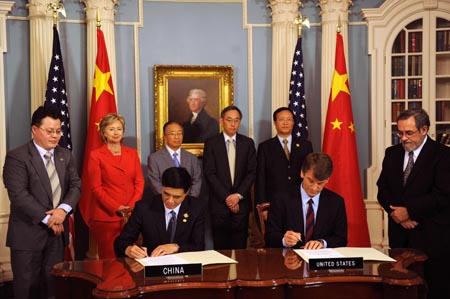| China, U.S. Sign MOU on Energy, Climate Change, Environment Co-op
|
 |
|
Zhang Xiaoqiang (L), vice minister of China's State Development and Reform Commission, and David Sandalow, assistant secretary of policy and international affairs at the Department of Energy of the United States, sign the energy and environment part of the bilateral Memorandum of Understanding (MOU) in Washinton D.C., capital of the United States, July 28, 2009. China and the United States signed the Memorandum of Understanding (MOU) here Tuesday on the cooperation in energy, climate change and environment. (Xinhua/Shen Hong) |
China and the United States signed a Memorandum of Understanding (MOU) in Washington Tuesday on the bilateral cooperation of energy, climate change and environment.
The signing ceremony was held in the U.S. State Department during the first round of China, U.S. strategic and economic dialogue opened here Monday.
China's State Councilor Dai Bingguo said at the ceremony that the signing of the MOU was "an important outcome" of this round of dialogue.
"The Chinese government attaches great importance to the dialogue between China and the U.S. on enhancing energy, climate change and environment cooperation," said Dai, calling on both countries to boost cooperation at a "strategic and long-term" view and under the principle of "common but differentiated responsibilities."
"Despite differences between our two countries in the basic national conditions, stage of development, historical responsibilities and our respective capacities, there exist conditions, common will, the necessity and broad basis for enhancing China-U.S. dialogue and cooperation on these areas," Dai told the ceremony.
U.S. State Secretary Hillary Clinton, who co-chaired the "Strategic Track" of the dialogue with Dai, said that the MOU was built on "past efforts including the 10-year framework for energy and environment cooperation, and highlights the importance of climate change in our bilateral relations by creating a platform for climate policy dialogue and cooperation."
"It also provides our countries with direction as we work together to support international climate negotiations and accelerate the transition to a low-carbon economy," Clinton said.
U.S. Energy Secretary Steven Chu also hailed the signing, saying he was pleased that these issues "come in the heart" of the U.S.-China strategic and economic dialogue and "will be critical part of bilateral relationship for years to come."
"Today's agreement sends a clear signal that the U.S. and China are ready to work together on clean energy and climate change it sets the stage for what I hope will be many years of close cooperation," Chu said.
He even expressed the hope that the agreement will "help us unlock the energy opportunity to clean energy and create jobs in new industries and vitalize our economies."
Noting that both countries have invested a lot and taken bold and impressive steps to improve energy efficiency and reduce greenhouse gas emissions, Chu urged the two countries to do more.
"The underlying principle is that ... we can accomplish more by working together than we can by working alone," the energy secretary said.
The issues of energy, climate change and environment are high on the agenda of the dialogue as part of the "strategic track" of discussions.
During the two-day discussion, the two countries had extensive discussions about what they are doing to reduce emissions, how they can move forward in advance of the UN Climate conference in Copenhagen this December and steps they intend to take to promote a sustainable low-carbon economy growth, officials said.
The China-U.S. Economic and Strategic Dialogue, the first of its kind between the world's biggest developing and developed economy, was jointly launched by Chinese President Hu Jintao and his U.S. counterpart Obama at their meeting during the G20 summit in London on April 1. The new mechanism is a reincarnation of a biannual strategic economic dialogue set up by the two countries in 2006 and a vice-ministerial strategic dialogue launched in 2005.
(Source: Xinhua) | 